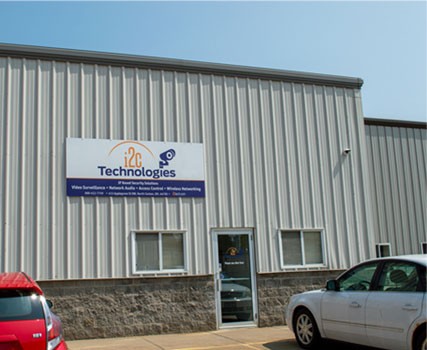Determining which security camera is best for your needs can be tricky because of all the available features to choose from. There are also quite a few misconceptions about what security cameras are and aren’t capable of. Let’s explore and debunk a few of these common video surveillance myths.
1. All Security Cameras Are The Same
While the base goal of security cameras is to collect video surveillance footage, each type of camera achieves that goal differently. Some security cameras use megapixel image sensors while some only use standard definition sensors. Others can record images at night using infrared technology, and others simply record in black and white or need the aid of a streetlight to pick up activity. In the end, it all comes down to whether the camera has quality optics. No matter the function, it’s important to examine every security camera’s specifications before purchase. Otherwise, you may end up with a camera that isn’t suited to your exact needs.
i2c Technologies can help you there. As an AXIS Communications Solution Gold Partner, i2c Technologies gives you access to video surveillance experts who can further explain a product you’re considering or give you recommendations on models that are suitable to your enterprise.
2. All Modern Security Cameras Are HD
More often than you might think, security cameras do not have high-definition capabilities. Standard analog cameras are still some of the most commonly purchased systems in the nation because of how affordable they are. Standard definition options are also available because some surveillance systems can’t handle high-definition cameras.
Luckily, i2c Technologies will provide you with a video management system (VMS) that can handle HD footage and security cameras that record the high-quality footage you need.
3. You Can Enhance Grainy Images
Contrary to what popular TV shows and movies would have you believe, it’s not possible to enhance a grainy image. If it’s already poor quality, trying to make the image larger on your computer will only further decrease its clarity. If having the best quality footage possible is a high priority, you should seek out an HD camera.
4. Security Cameras Can See Everything
What your security camera can see is largely determined by its placement, type of lens and ability to move. If you need your security cameras to record what’s going on at night, they will also need to have thermal or infrared capabilities — otherwise, you’re limited to the radius of nearby lights.
i2c Technologies can aid you in addressing each of these struggles. Our experts can help determine the best placement for your security cameras and advise you on whether a fixed or pan-tilt-zoom (PTZ) camera would be best for each location. In addition to PTZ capabilities, there are also security cameras with panoramic lenses available, giving you anywhere from 180° to 360°of coverage. There are even thermal and infrared video surveillance options available for nighttime footage.
5. Security Cameras Record Everything Even While Zoomed In
Just like regular cameras, security cameras may miss an event if they are constantly zoomed in to a particular spot. For this reason, it is important to have a video management system that has guard tour capabilities. When activity is detected, the VMS will direct the PTZ camera to zoom in on the activity and then resume normal guard tour recording once the activity ceases.
6. All Wireless Cameras Are Completely Wireless
Many wireless security cameras still need to be plugged into an electrical outlet for power, so they are not truly wireless. They can burn through batteries quickly, so they may need to be plugged in for more consistent power. Wireless cameras can sometimes suffer from Wi-Fi interference from other nearby devices, so having them wired in can provide a more stable connection for footage transmission.
7. Security Cameras Are Only For Deterring Crime
While this is probably the most common use of video surveillance systems, deterring crime is not the only thing security cameras are good for. Video surveillance cameras are extremely useful in manufacturing facilities for monitoring quality control and workplace safety.
Additionally, thermal security cameras can be used to monitor temperature fluctuations of equipment at manufacturing plants or other facilities. If temperatures exceed a set threshold, or if a leak is detected, the color-coded footage will alert personnel of the issue right away to keep operations running smoothly.
No Matter Your Needs, i2c Technologies Has The Solution
At i2c Technologies, we won’t let you get caught up in the misinformation about what security cameras can and can’t do. Our experts are ready to help you find the perfect video surveillance system for your unique needs and budget. Contact us for more information and recommendations today.


